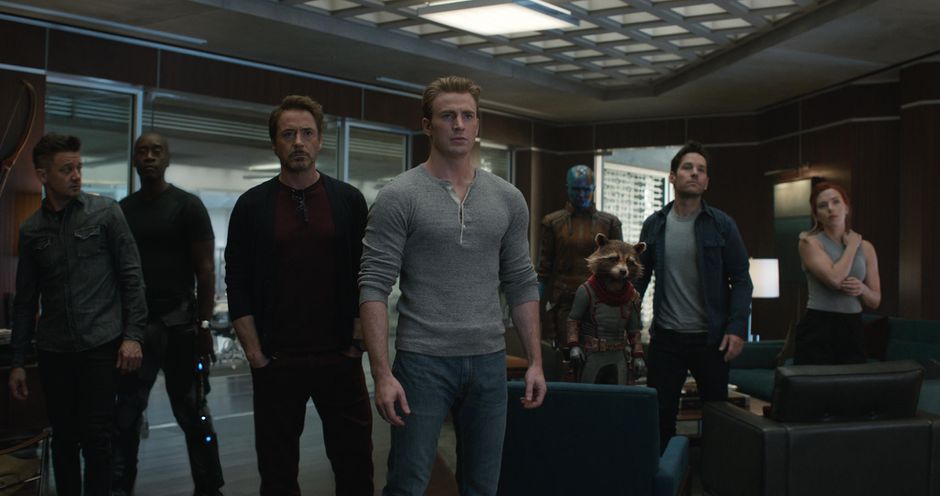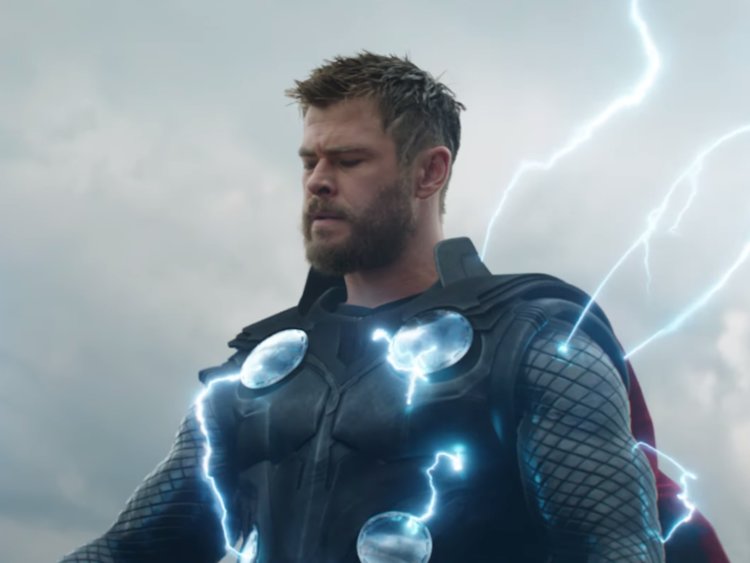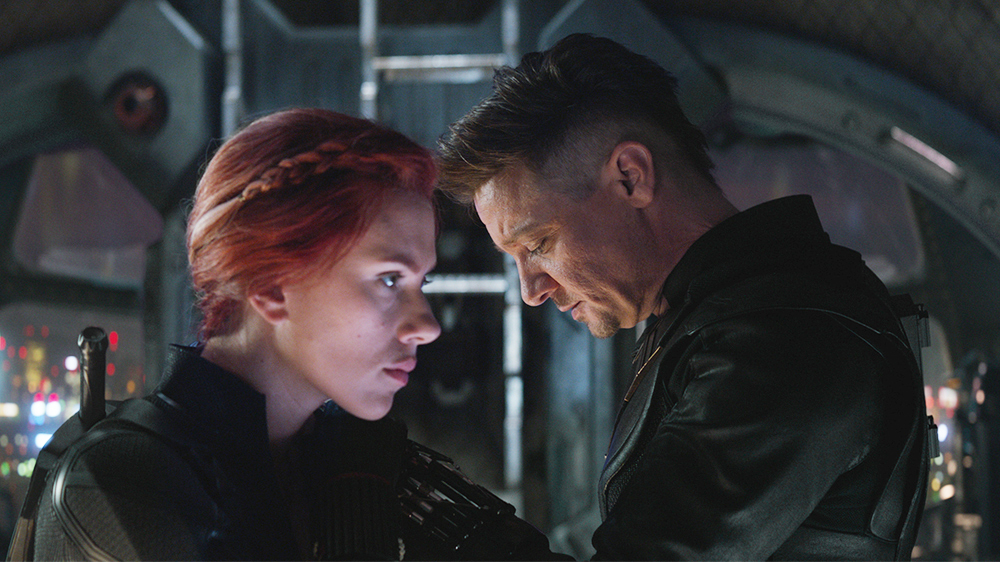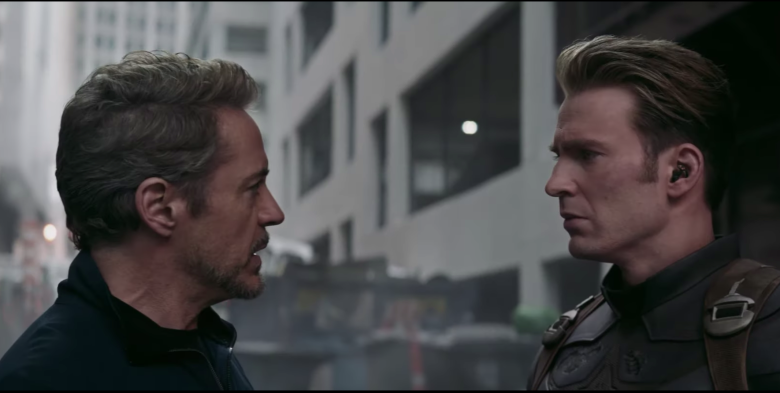
In one of the very first scenes (spoiler alert!) in Avengers: Endgame, Tony Stark—marooned in deep space, with hope and oxygen levels dwindling—beams out an interstellar valediction that doubles as a cinematic prophecy. “This is going to be one hell of a tearjerker,” declares the playboy inventor who more than a decade ago donned a metallic suit and launched the mother of all franchises. Setting aside the industrialist’s dire circumstances, the supposed catalyst for those tears is right there in the title. After 11 years, 21 movies, dozens of costumed characters, and billions in box-office grosses, Endgame is designed to bring the Marvel Cinematic Universe to a close.
Whether this in fact brings tears to your eyes is a matter of personal taste, but what cannot be denied is the enormity of this enterprise. Endgame, again directed by Anthony and Joe Russo, is an absolutely massive movie, so full of stuff—fights and flights, flash-forwards and leaps backward, deaths and resurrections, callbacks and cul-de-sacs—that its three-hour runtime seems almost slender. It may not be the best superhero movie ever made—in fact, I’d wager Tony’s conspicuously placed Audi against it—but it is unquestionably the biggest.
Which makes its relative cohesion all the more impressive. To be sure, Endgame suffers from the same problem endemic in most of the MCU’s crossover pictures, namely that it’s so chock-full of characters, it’s impossible to devote significant time to most of them. Yet where the Russos’ prior behemoth, Avengers: Infinity War, often felt bulky and scattered, Endgame is surprisingly nimble and streamlined. Thanks in particular to sharp editing—the film cuts between its various heroes (and planets, and timelines) with fluidity—it moves with real energy.

The story giving rise to this energy is less rousing. You will surely recall, assuming that you’re one of the 72.4 million Americans who bought a ticket to Infinity War, that it concluded with the villainous Thanos (Josh Brolin) magically exterminating half of the universe’s population, including many of our beloved heroes (though none, as fate and commercial savvy would have it, of the six original Avengers). The overarching plot of Endgame centers on the herculean efforts of our remaining headliners to somehow reverse that interplanetary cleansing, combining their considerable powers to restore balance to the universe.
This development is predictable, sensible, and somewhat deflating. Infinity War was a largely forgettable movie with an unforgettable climax. The laws of commerce may have dictated that its galactic genocide would be temporary, but it’s nevertheless disappointing that the MCU’s grand finale operates as little more than a frantic attempt at a cosmic do-over. And while Endgame briefly wrestles with the notions of heartache and loss—its momentarily glimpsed vision of a barren world where people soldier on without their loved ones conjures memories of The Leftovers—it mostly treats death and grief as problems to be solved rather than truths to be reckoned with. By their nature, superhero films carry the potential for exotica and the promise of discovery, but Endgame’s paramount concern is returning things to the status quo.
Well, what did I expect? For all its noise and color and surface imagination, the MCU has always been a place ruled by safety and order. Villains emerge only to be vanquished, heroes face obligatory struggle on their march toward inevitable triumph, and viewers sate their appetites to watch their favorite childhood champions in action without ever being especially challenged. So it’s fitting, and maybe ingenious, that Endgame structures itself as a kind of greatest-hits machine. Not only does it pay tribute to as many characters as possible, including those long dead or gone—by my count, fifty-one principal players receive screen time—but it also revisits some of the most sacred sites in comic-book lore. I am speaking, of course, of the MCU’s prior movies.

That’s because Avengers: Endgame is, in bold strokes, a time-travel film. Jumping ahead five years from the snap heard round the world, it initially locates its erstwhile warriors attempting to adapt to their new normal, with varying degrees of success; Iron Man (Robert Downey Jr.) has a daughter, Hawkeye (Jeremy Renner) has a death wish, Thor (Chris Hemsworth) has a beer belly, etc. But when Ant-Man (Paul Rudd) arrives unexpectedly after a prolonged stay in the, er, quantum realm, the heroes devise an audacious plan to return to the past and steal the mythical infinity stones, thereby allowing them to undo Thanos’s dastardly deed. As Ant-Man says, “It’s a time heist!”
That’s a funny line. And while I will spare you most of the pseudo-scientific mumbo-jumbo that follows, I will note that the screenplay, by Christopher Markus and Stephen McFeely, proves healthily aware of its own absurdity. There are concerns about time paradoxes and hypotheses about splintered realities and jokes about Back to the Future, all delivered with the knowing recognition that this is the Russos’ only way out of the supernatural corner that they previously painted themselves into.
Endgame’s premise may be very silly in the abstract, but the MCU has gradually broken the conventional boundaries of cinematic realism; as one character points out, “I get emails from a raccoon.” And once you accept the parameters of the Russos’ challenge, you are likely to find the movie’s second act—in which different characters are again paired off and sent on their own retrieval missions—to be a great deal of fun. Iron Man and Captain America (Chris Evans), brief enemies during the events of Captain America: Civil War, continue to nourish their grudging mutual respect. Thor and Rocket (Bradley Cooper), the most inspired combo from Infinity War, sling hammers and barbs. Black Widow (Scarlett Johansson) and Hawkeye, perhaps bonding over never headlining their own feature, travel to a distant, clouded planet, where they act out a pivotal scene from Spartacus.

The script’s dialogue is characteristically smart and spry, but what makes Endgame both entertaining and weirdly self-fulfilling is the way it integrates its action with earlier MCU installments. Iron Man and Captain America’s adventures return them to the mammoth battle in the first Avengers, where they attempt to outfox Thor’s trickster brother, Loki (Tom Hiddleston), and where the Russos wittily restage Cap’s signature elevator fight from Captain America: The Winter Soldier. Hulk (Mark Ruffalo), whose humongous green meanie has now miraculously merged with his human form in Bruce Banner, ends up stumbling into the mystical realm from Doctor Strange, where he trades blows and metaphysical musings with Tilda Swinton. Nebula (Karen Gillan) and Rhodes (Don Cheadle) land on a craggy outpost just in time to watch Peter Quill (Chris Pratt) saunter through the same giddy dance-and-kick routine that functioned as his introduction in Guardians of the Galaxy.
There are many more. In some ways, Endgame feels a bit like homework, testing viewers on just how well they know the MCU’s sprawling history, and rewarding them for studying extra-hard. And while some of these pieces of reverential referentialism are delightful—I’m thinking particularly of Captain America facing off against a more idealistic version of himself, and of Hulk barreling down a set of stairs and straight through an oblivious fellow avenger—they also betray the film’s overriding artistic principle: to service its fans. For all of the apparent fretting about saving the galaxy, the real purpose of the story is to immerse viewers as deep into the MCU as possible, to remunerate their years-long devotion to the franchise with fleeting moments alongside their favorite characters and inside their favorite worlds. There may be accompanying flourishes of comedy and derring-do, but it is this act of communion—a kinship between benevolent studio overlord and worshipful ticket-purchaser—that is expected to serve as its own reward.
This doesn’t mean that Endgame is devoid of excitement or wit. To the contrary, the movie’s second hour is clever and effervescent. But in its final third, its spirit of whimsy and invention slowly succumbs to the usual blockbuster imperatives—clanging battles, daring rescues, hordes of extras engaging in bloodless violence—which the Russos struggle to imbue with any flavor. In The Winter Soldier and especially in Civil War, the sibling directors showcased an unusual knack for superhero action, which they heightened through a canny blend of lightness and precision. But here, as in Infinity War, they seem overwhelmed by the need to put on a massive show. Characters run and jump and fly, but their movements are so unmoored from the physical world as to feel insubstantial. Thanos in particular is a boring combatant, his giant, computer-generated purple body lumbering around with supposed strength but really just doing a lot of snarling and grunting. There are a few cool tracking shots and some flashes of surprise, but mostly, there is weightless sound and fury.
Of course, action has always been secondary in the MCU, a franchise that is typically better at supplying snappy humor and sharp character dynamics than at conveying the mechanics of actual heroism. To that end, there are moments of true resonance in Endgame’s climax, most notably when a stoic revenant issues the basic geographical alert, “On your left.” But the movie’s sheer lugubriousness—its sweaty need to invest its closing passages with as much emotional gravity as possible—prevents it from landing with the triumph that it so desperately craves. There are quite a few tearful reunions and weepy goodbyes, and a handful of people actually die; it’s reasonably moving, but the impact derives less from what the characters say and do than from the simple fact that we’ve spent so many years watching them.
And that is really the point. Ignoring the MCU’s plans for future productions (see you in July, Spider-Man!), Endgame is noteworthy for its finality, and it treats the conclusion of its heroes’ lengthy journeys with a solemnity that feels both appropriate and arrogant. It’s telling that the closing credits feature the six leads signing their own names, as though they’re dispensing mass autographs to adoring fans at a collectors’ exhibition. We are grateful for their work, but we are also reminded that our gratitude has already been assumed. Some of the best superhero movies use outsized storytelling to celebrate the virtues of ordinary people: teamwork, decency, sacrifice, nobility. Avengers: Endgame celebrates all of those things and more, often quite well. But most of all, it celebrates itself.
Grade: B-
Jeremy Beck is the editor-in-chief of MovieManifesto. He watches more movies and television than he probably should.
